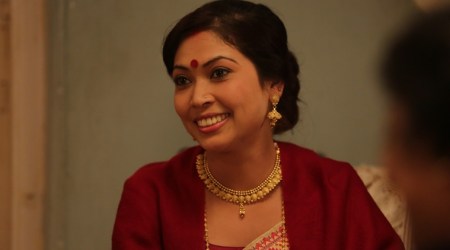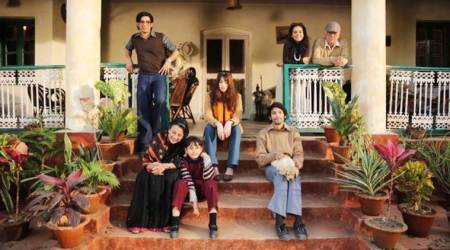 Konkona Sen Sharma talks about Lipstick Under My Burkha and how it shatters stereotypes.
Konkona Sen Sharma talks about Lipstick Under My Burkha and how it shatters stereotypes.
Konkona Sen Sharma has always been a character-actor. The seasoned artiste that she is, she doesn’t really care if she is pleasing the audience or not. She is there to do her part, to tell a story, to show the audience the real side of a character that doesn’t exist. Konkona talks to the point, but every point is filled with passion. Here’s part one of the interview we did with the actor where she opens up about Lipstick Under My Burkha, and all the hardships that surrounded it.
Lipstick Under My Burkha is finally coming out, how does it feel?
It feels like a long journey, almost three years because when we were making the film, we never ever thought that it would reach the space that it has reached, and it’s become a bit of a movement almost, and I had never anticipated that at all. But I’m really excited because people are really interested in knowing what the film is about and I think that what the film is about is very important because it’s something that we never get to see. We have certain notions about how women’s lives are supposed to be, and many women take care that it’s maintained, whatever they have analysed, and it’s maintained. ‘Aisa hona chahiye, aisa hi hain. Aisa nahi hain’ (It has to be this way, It is this way. It is not this way).
Is the movie going to break the idea of the ideal life that a girl should live?
I don’t know if it’s going to break it for you or for somebody else, but I do think that the film shows a very authentic experience of different women across different ages and different religions, and the commonality of that experience, which is not something which is really acknowledged in the public sphere.
Women who talk about things openly, express their feelings or speak their mind, are now called as ‘feminazis’. What is your take on that?
I don’t like this word, “Feminazis”, or “libtard”, I don’t like these words, because I feel there’s no true understanding of the word “feminism”, there’s no understanding of the word “liberal”, and I find these very derogatory and insulting.
I feel that there’s such a history of feminism, and without feminism we wouldn’t be able to, like you and I are both working in a city and talking about these things, you will be writing about this and people will be reading it, this was not possible a few decades back. Just the fact that we can vote today, it’s such a new phenomenon. We can’t take these liberties for granted because we have really fought hard for these few liberties that we have now. It can so easily be taken away from us again, so it’s really important to learn and acknowledge where we were, how far we’ve come, of course, there’s a long way to go still, but it’s an important movement, and I think such words are undermining that.
In the trailer you look like a woman who is always listening to her husband. Like “Woh jazbaat mein beh jaate hain…”. So tell us a little about your character, Shireen Aslam.
Shireen is very different from me and my mind. She’s a mother of three, a woman in her 30s, she wears a Burkha and she comes from a fairly patriarchal, conservative kind of a setup. She doesn’t have the exposure, the understanding or the education to challenge these in and of itself. What I love about her is that she has a lot of ingenuity, and innovative ways to get what she wants, and it breaks my heart, because it’s too high a cost for her to say “no!”, “I will do this, I want to do this”, she can’t do that, the cost is too high. But she finds loopholes in the thinking, or she finds ways to subvert it, how to get around things and it’s heartbreaking what she has to do just to get so little. It’s like a small step for us, it’s a giant leap for her, so I find it admirable and heartbreaking.
Prabita had gone for a workshop and she wore a Burkha and went out, and she was like, “It’s heartbreaking because don’t even look into your eyes, there’s no eye contact.” So how was it for you, wearing a Burkha? It’s easier for you to slip into a character, we’ve always seen that, but in this movie, in this character, how easy or difficult was it for you to wear a Burkha and be this character?
I have played a character earlier in a film called “Mitch”, where I also wore a Burkha, and in both films I found that women use the Burkha to their own advantage, thank God! It’s something that is being dictated to us, and women historically have been dictated to, in terms of what we should wear, how we should think, what we shud do. It is dictated to us, historically speaking, regardless of class or money, caste, religion or nation. I find Shireen’s character and even in the other film, they use it to their advantage, because you have very few weapons in your arsenal, and what you have, you have to make the most of. So I love the fact that they are able to do that. I personally didn’t find it so difficult, because I was acting a part, so it’s not like I was wearing the Burkha all the time. I think Prabita did, she wore the Burkha and she travelled, so she had the experience of it, but I wasn’t, and there are scenes where she is not wearing a Burkha as well, which is really important, so both are important.
When the trailer came out, 80% people loved it, but 20% were like, “Why did you have to show so much sex in the trailer?”, It was trolled and there were open letters also written to Ekta Kapoor. How do you look at these trolls or the wat women pull down women, doing that? What is your take on social media trolls?
Just ignore it. I mean, people are going to think what they want to think, we can’t stop our work. Why give them that importance? Let them say what they want to say, who’s hearing? I’m not hearing! I’m not interested! I have too many interesting things in my life! Also because I’ve never been a mass-appeal kind of an actor, so I don’t have to worry, I don’t have to please everybody, you know what I mean? I have to please me, personal foremost, I have to do work that I find interesting, that pleases me, by and large. So it’s okay, it doesn’t matter.
Expectations from Lipstick Under My Burkha – that dialogue has started, women talking about their desires, the movie is also for women and their stories, so how do you think it’s going to have an impact on the society?
I think that it’s going to be so true for so many women and for men, because men and women, especially I think, married men, they know the workings of adult women’s lives, but sometimes they choose to do something about it, but sometimes, they don’t. And it’s important because for a lot of women, it will feel like “Oh, that’s my story, this happens to me.” For example, even rebellion in urban, young women is acknowledged and accepted, you know like, “Achha theek hain, woh cigarette peeti hain”, it’s a very superficial kind of narrative, but it’s accepted. But in Bhopal, what a 50-year old woman may be desiring or not desiring, nobody wants to know, it makes them very uncomfortable. But I think for a lot of women, not just the characters in their 30s, and not just characters in their 50s, or even their 20s, I think this will ring true for a lot of women, and even for a lot of men. Because we choose to just smooth it over, or overlook it, and say, “Yeah, we’re happy, we’re leading fulfilled lives”, but these kind of things do happen. It’s not all bad, there are moments of triumph, moments of joy and unexpected moments of beauty also in the film, but there are also like a realistic notion of what a marriage is, a realistic notion of what it’s like when your desires are stymied, and how it to overcome it, or how some women may be thinking of overcoming it.
So the dialogue about women’s desires, women’s role in the society is shown in a lot of commercial Hindi films in a very different way, not necessarily in a good way, and your film comes across as what women want, and what they’re talking about. What do you think about the wrong way of communicating about women?
Because women are not telling their own stories, because the bulk of the films that are being made over the last few decades, have been made by men, not just the directors, but the producers and where the money comes from, is also from the men. So the bulk of the decision making and the bulk of the directors is men, so it’s the men who are killing these stories or taking these decisions, and that has been the mainstream narrative. So, very few women are telling stories about what it’s like to be a woman, or even stories about society and men, and it’s not like every time a women makes a film, they’re going to make it about this, they can also make it about men. We also need to be interested in the truth, audiences are very okay with this kind of whitewashed narrative. Yeah, we’re going to accept that woman is only going to be between 18 and 27 years old, or that once she gets married, everything is going to be fine after that, and that we’re only interested in romance before marriage. So if you’re okay with all of this, then you watch all of this only in your films.

